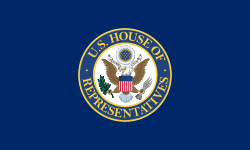| Chief Administrative Officer of U.S. House of Representatives | |
|---|---|
 Seal of the United States House of Representatives | |
 Flag of the United States House of Representatives | |
| Abbreviation | CAO |
| Seat | Washington, D.C. |
| Nominator | Speaker of the House |
| Appointer | The House with a majority vote |
| Term length | Elected at the beginning of the new Congress, and upon a vacancy during a Congress. |
| Constituting instrument | H. Res. 6 (104th Congress, 1st Session) |
| Precursor | Director of Non-Legislative and Financial Services |
| Formation | January 4, 1995 |
| First holder | Scot M. Faulkner |
| Website | cao |
| This article is part of a series on the |
| United States House of Representatives |
|---|
 |
| History of the House |
| Members |
| Congressional districts |
| Politics and procedure |
| Places |
The chief administrative officer of the United States House of Representatives (CAO) is charged with carrying out administrative functions for the House, including human resources, information resources, payroll, finance, procurement, and other business services.
Contents
Along with the other House officers, the chief administrative officer is elected every two years when the House organizes for a new Congress. The majority and minority party conferences (the Democratic Caucus of the United States House of Representatives and Republican Conference of the United States House of Representatives) nominate candidates for the House officer positions after the election of the speaker of the House. The full House adopts a resolution to elect the officers, who will begin serving the membership after they have taken the oath of office.
The office of the chief administrative officer was first created during the 104th Congress, which met from January 3, 1995, to January 3, 1997. It replaced the position of the doorkeeper of the United States House of Representatives, which was abolished at the same time. Scot Faulkner of West Virginia served as the first CAO. During his tenure he led the reform of the scandal-plagued House financial system, abolished the Folding Room, and privatized postal operations, printing, and shoe repair. Mr. Faulkner's office also implemented the first House Intranet (CyberCongress) and expanded digital camera coverage of the House Chamber and committee rooms. Faulkner's reform efforts are chronicled in the books Naked Emperors (Rowman & Littlefield Publishers, Inc., February 2008; ISBN 0-7425-5881-9) and Inside Congress (Pocket Books, August 1998; ISBN 0-671-00386-0].
The current CAO, Catherine Szpindor, took office on January 3, 2021. John Clocker is deputy chief administrative officer for the U.S. House of Representatives. [1]
